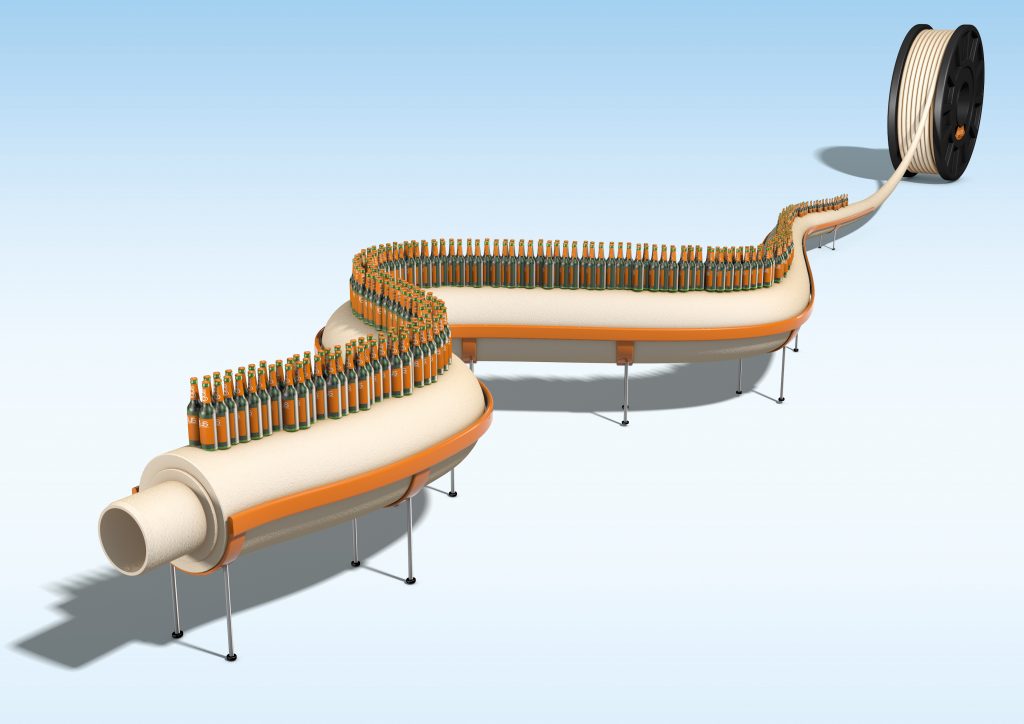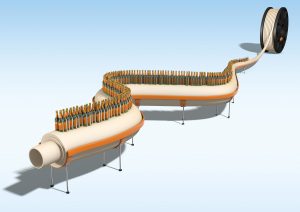
3D print material from igus for food technology
December 12, 2017 | By Rehana Begg
 With the iglidur I150 tribo-filament, lubrication-free and maintenance-free components can be printed, among other things for the safe movement in the food and beverage industry. (Source: igus GmbH)
With the iglidur I150 tribo-filament, lubrication-free and maintenance-free components can be printed, among other things for the safe movement in the food and beverage industry. (Source: igus GmbH) 
With the iglidur I150 tribo-filament, lubrication-free and maintenance-free components can be printed, among other things, for the safe movement in the food and beverage industry. (Source: igus GmbH)
The 3D print material iglidur I150 developed by motion plastics specialist igus has now been approved for food contact according to EU regulation 10/2011. By the certification of this Tribo-Filament that has a versatile use, customers can now print their custom-made parts which are approved for direct contact with food or cosmetics in moving applications. The material is lubrication-free and maintenance-free and can be used even on 3D printers that do not have a heated printing plate.
With the certified iglidur I150 Tribo-Filament, lubrication-free special parts for movement in the food industry can be produced quickly and cost-effectively. iglidur I150 can be processed on any 3D printer where the nozzle temperature can be set to 250°C. Since the high-performance plastic has a very low shrinkage, it can also be processed on 3D printers that do not have a heated printing plate. In this case, the igus adhesive film is recommended as the base for the print bed in order to ensure good adhesion. “iglidur I150 is extremely versatile and therefore also interesting for many other industries,” explains Tom Krause, product manager for Tribo-Filaments at igus. “It is very tough and the easiest Tribo-Filament to work with. The material has an impressively high wear resistance at surface speeds of up to 0.2 m/s.” In the igus test laboratory, iglidur I150 showed a much higher abrasion resistance compared to classic 3D printing materials for a large number of different test parameters.
Lubrication-free wear parts easily printed
In addition to iglidur I150, the polymer specialist igus has five other lubrication-free and maintenance-free iglidur Tribo-Filaments for a wide range of applications – for example, where permanent load or chemical resistance is required. Common to all is that they are characterized by high abrasion resistance and are up to 50 times more wear-resistant than standard materials for the 3D print. The 3D print with the tribo-filaments from igus is a good option especially in the production of complex moving parts subject to wear in jigs and fixtures, in small batches and special machine construction. For customers who do not have their own 3D printer, igus offers a 3D printing service for wear parts, made from both the iglidur Tribo-Filament and its own laser sintered material iglidur I3. Customers can upload their data, choose the material, calculate prices and order their individual wear parts directly online.
The test results are available online at www.igus.eu/tribofilament.
